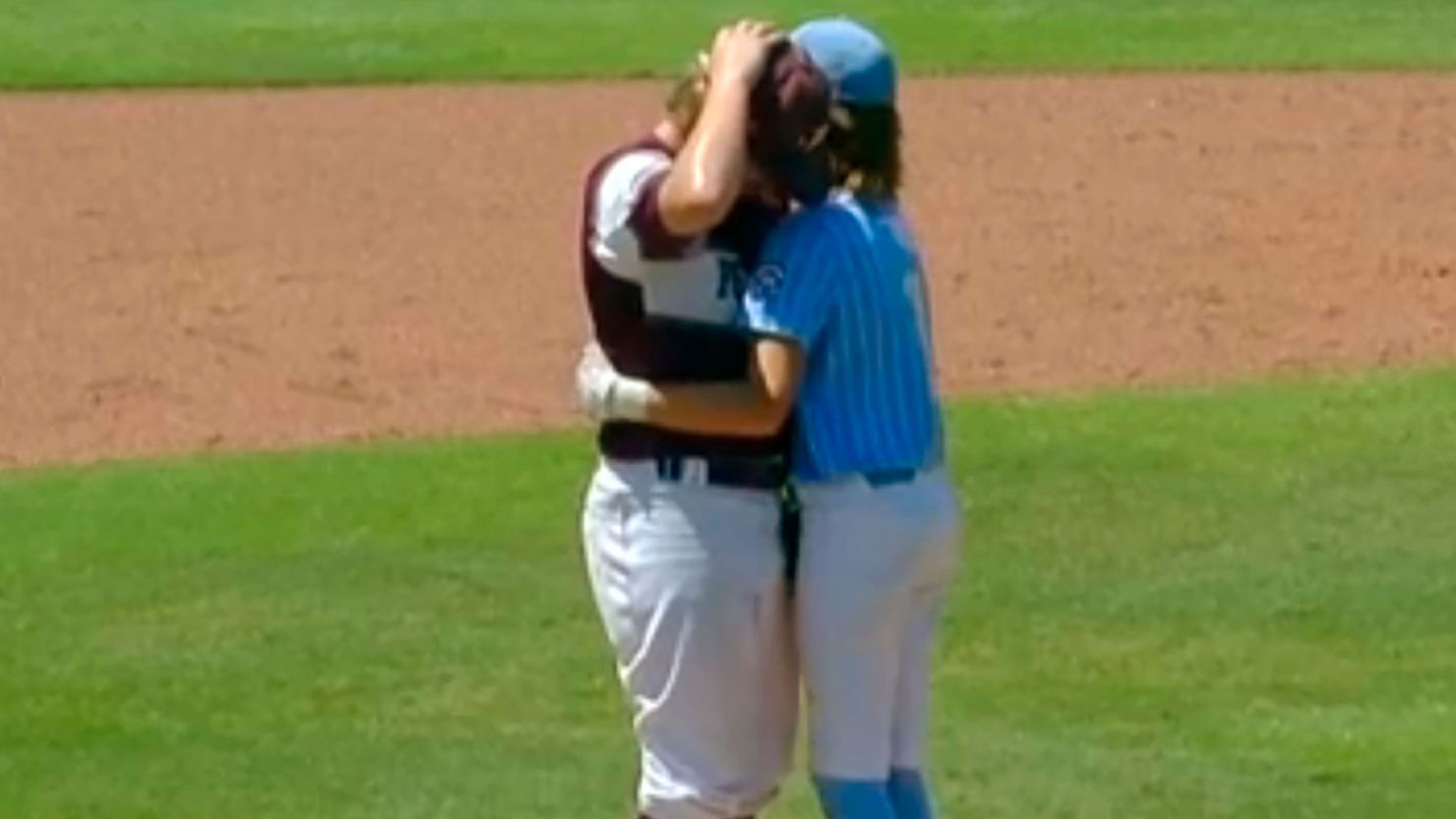Editor’s Note: Peggy Drexler is a research psychologist, documentary producer and the author of “Our Fathers, Ourselves: Daughters, Fathers, and the Changing American Family” and “Raising Boys Without Men.” She is an executive producer, most recently, on “My Name is Pauli Murray,” a film that premiered at Sundance, is now streaming on Amazon Prime Video. The opinions expressed in this commentary are hers. View more opinion on CNN.
What is it about the story of the Little League baseball players caught in a tearful embrace that has everyone on social media tearing up?
Earlier this week, at the Little League Southwest Regional championship in Waco, Texas, the home team’s 12-year-old pitcher Kaiden Shelton lost control of a pitch, hitting 12-year-old Oklahoma batter Isaiah Jarvis in the head, knocking off his helmet and sending him to the ground. Both boys were shocked. But instead of getting angry, after walking to first base, Jarvis headed to the mound to pull his opponent, who was visibly shaken, into an embrace.
A video of the moment, shared on Twitter by ESPN, swiftly went viral. The boys have been featured on several major news outlets, hailed as models of kindness and sportsmanship.
Clearly, we could use some good news around here.
At a time when there’s so much in the world to feel scared of and threatened by – the war in Ukraine, a former president under investigation, the first state to pass a restrictive law against abortions since Roe v. Wade was overturned, the latest Covid-19 wave, the list goes on – displays of kindness and compassion feel rare, almost surprising.
We find ourselves searching, maybe a little desperately, for signs of goodness and humanity and hope. To find it here, among these young athletes, is perhaps particularly surprising, given youth sports has in recent years been looked at and criticized as a hotbed of competitiveness and hostility.
In her new book, “Take Back the Game: How Money and Mania Are Ruining Kids Sports—and Why It Matters,” author and coach Linda Flanagan writes about how kids these days are more likely to burn out from the ever-competitive demands of youth sports (and the adults overseeing them) than develop healthy habits. For one thing, the stakes are higher: competitive play is often a ticket to college, and the scholarships to help pay for it.
Meanwhile, the backlash to the “participation trophy” may be deserved, but it also may have helped reinforce the message that, in fact, winning is what matters.
Within boys sports in particular, there are also matters of masculinity and “what makes a man.” While many parents today are taking a much more gender-neutral approach to parenting than generations prior, boys are still encouraged by society, their loved ones and each other to be tough and to tough it out. To win.
Stanford human biologist Judy Chu has found that by age five or six, boys begin to strive to appear less “feminine,” including disconnecting from feelings of weakness, rejecting friendships with girls and beginning to adopt behaviors typically viewed as “natural’ for boys, like being stoic, competitive and aggressive. Even the best-intentioned parents, as I learned when researching and writing my first book, “Raising Boys without Men: How Maverick Moms are Creating the Next Generation of Exceptional Men,” are confused about how to think about masculinity, often dividing it into either “good” or “bad.”
And then as boys get older, of course, and spend more time outside of the home, the pressures intensify. A 2018 national survey of more than 1,000 10-to-19-year-olds commissioned by Plan International USA, a nonprofit that works to overcome gender inequality, found that while young women believed there were many ways to be a girl, young men described just one narrow route to successful masculinity. One third said they felt compelled to suppress their feelings, to “suck it up” or “be a man” when they were sad or scared, and more than 40% said that when they were angry, society expected them to be combative.
All of which is why this baseball incident has been so heartwarming – and such a great opportunity to remind parents of the need to talk with their kids about kindness and compassion, even (maybe especially) on the playing field.
It’s a reminder of the need to give kids permission to express a full range of desires, emotions and interests. This reminder goes for coaches, too: A 2013 study published in the American Journal of Preventative Medicine of 2,000 male high-school athletes found significantly reduced rates of dating violence and a greater likelihood of intervening to stop other boys’ abusive conduct among those who participated in weekly coach-led discussions about consent, personal responsibility and respectful behavior.
That said, it’s important for parents – and all of us – to remember that cultivating healthy masculinity is not about dividing masculinity into “good” and “bad” or replacing one list with another, which just imposes on boys another set of external expectations. Not all masculinity is toxic, and kids shouldn’t be forced to conform to any particular way of being.
Instead, parents and educators would do well to ensure the conversation around masculinity also fosters critical reflection and a connection to sense of self. We should be asking boys, what feels true to you? We should not be telling them, this is or isn’t the way to be. And we should be reminding them as much as possible that there’s no one right way to be a boy. Let them know it’s okay to make mistakes; tell them about some of your own. And, most importantly, let them know they’re not alone.




